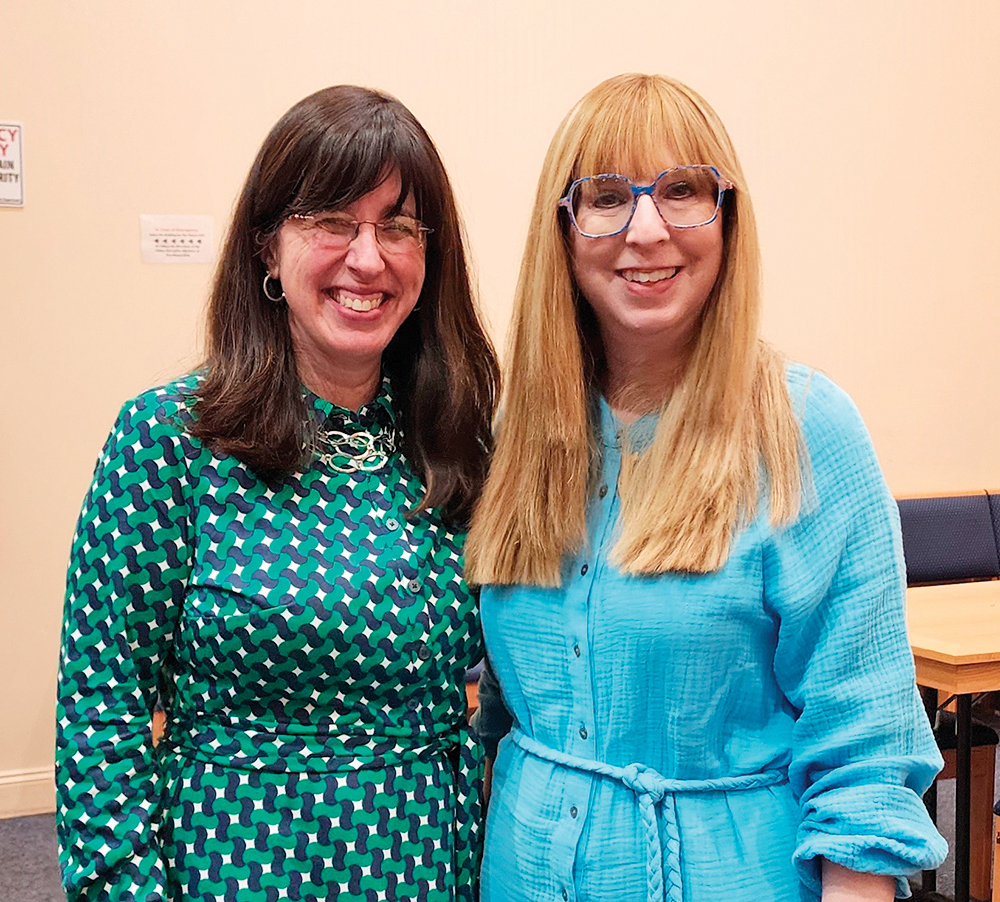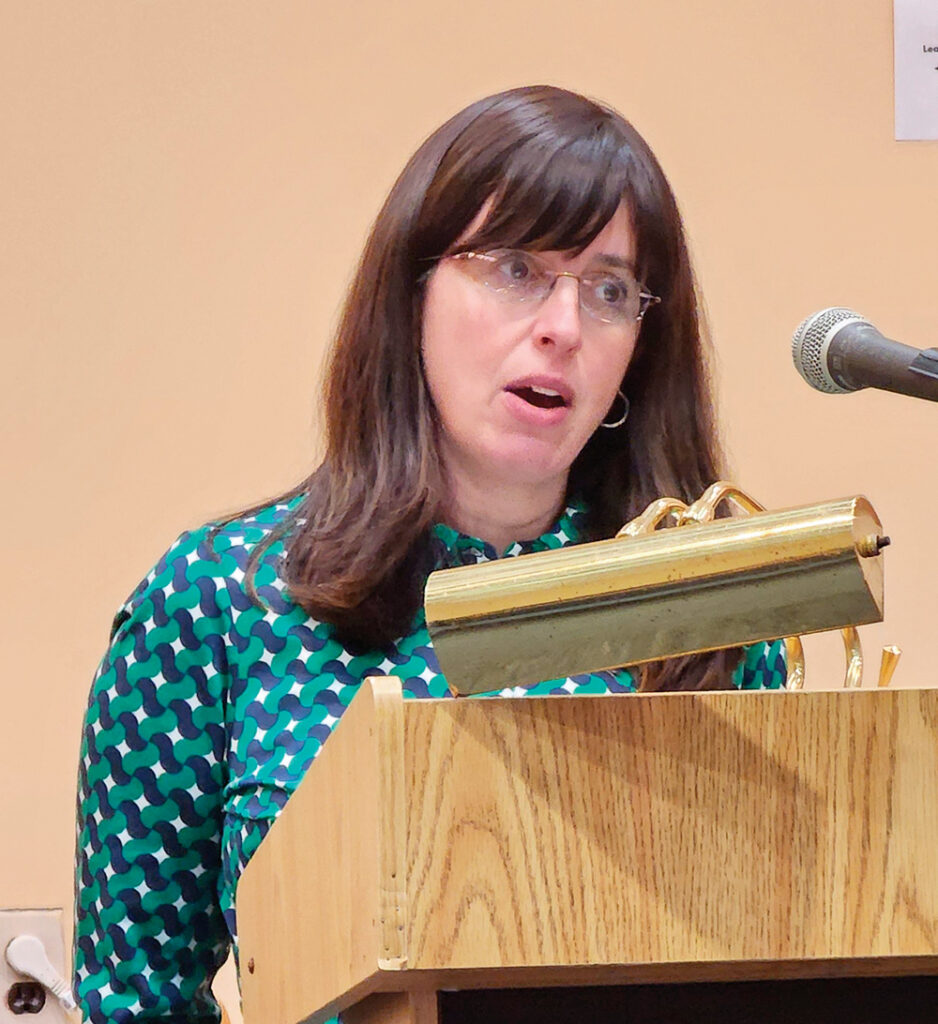
With the new school year right around the corner, Highland Park’s Congregation Ohav Emeth presented a timely session on “Antisemitism in the Secular World: Strategies for high school and college-aged students dealing with antisemitism on campus.” Several dozen people attended the session presented by Dr. Rebecca Cypess on Sunday evening, August 18. Cypess became the Mordecai D. Katz and Dr. Monique C. Katz dean of the undergraduate faculty of arts and sciences at Yeshiva University’s Stern College this summer, having previously served as professor of music and associate dean for academic affairs at Mason Gross School of the Arts at Rutgers University in New Brunswick.
Cypess began her presentation with a note that the issue under discussion transcends partisan politics in both the United States and Israel, and that it is important for all to hear and understand. She grew up in a home where academia and learning were valued and universities were revered as sites to motivate thinking, cultivate ideas, and promote understanding. The small Jewish community at the secular college she attended as an undergraduate student taught Cypess to be a leader, as she learned to advocate for the Jewish community and plan events.
Early in her tenure at Rutgers, she and another Jewish professor discussed the need for conversations and advocacy for Jewish employees at the university due to the occasional flare-ups of antisemitism on campus. She served for eight years as founding co-chair of JFAS (Jewish Faculty, Administrators and Staff), a group dedicated to combating antisemitic and anti-Israel bias and to promoting a supportive environment for Jews on campus. There were about 30 people on their initial mailing list, with the number increasing to about 120 in September 2023. The events of October 7 saw an increase to more than 300 under new JFAS leadership due to concerns regarding protests and other anti-Israel happenings at Rutgers.
Cypess views higher education to be an amalgam of enlightenment, increased understanding and pursuit of knowledge for its own sake—similar to the intent of learning Torah lishma, for its own sake. Research should be totally independent, with no predictions of desired results. When research begins with an assumption or bias, it comes with an “activist stance.” “Since the 1960s, we’ve seen more scholarly activism take over academia,” she said. “Research is no longer objective or dispassionate or without preconceived notions.”

The anti-Jewish movement on campus did not surprise Cypess, but the speed with which it spread and the vitriol and venomous nature were striking. With over $10 billion of foreign money from Muslim countries flowing to American universities since 2021 and the social media blitz of anti-Israel posts, it was inevitable that protests and demonstrations would occur. The AI/social media world has been focusing on making the generation of college-age students more reactionary and having them see things in a certain focus with faculty planting seeds of misinformation about Israel and the Jewish people for years.
The broader Jewish community at Rutgers had concerns about the bizarre response the University presented to the murders at the Jersey City kosher food market in 2019, where the administration apologized to those offended by previous
mention of condolences to the Jewish community. The Rutgers Law School Center for Security, Race, and Rights on the Newark Campus has been featuring a constant barrage of speakers and events that are anti-Israel and promote anti-Zionism. Cypess noted that the center is funded from the university’s discretionary budget that comes from our tax dollars and noted that universities fund what is of value to them, meaning that support for the center is a Rutgers value. At universities such as Columbia, people from on- and off-campus prey on the uninformed with misinformation, while mainstream media accept all accounts and numbers from Hamas as credible sources. These propagandized views penetrate society and find a home on college campuses.
JFAS put a document together to present to Rutgers leadership to engage them and advise on how to tone down the tensions and rhetoric on campus but had limited success. The situation at Rutgers was not consistent across all New Brunswick campuses or majors. Students at the school of engineering, for example, were not affected due to their relative isolation in their classrooms on Bush Campus. Conversely, students on the College Avenue campus were subject to a constant barrage of anti-Israel rhetoric from the “free speech zone” located directly next to the dining hall and across the street from Rutgers Chabad. The general consensus was that Rutgers acted too slowly to tone down the rhetoric, and in some cases, did not act at all. The pro-Palestinian protesters expanded their protests beyond the free speech zone into areas that should have been neutral, such as the Alexander Library and the Student Center, and even into classrooms. Some students at Mason Gross expressed concern about themed artwork that they felt was intimidating to Jewish students.
Of immediate concern is the campaign to delegitimize campus Hillels at many universities because of the perception that they support Zionism and organize Birthright trips to Israel. While some may say that being anti-Zionist is not being antisemitic, it is clear that love and support of the land of Israel is a crucial part of being Jewish. Parents and community members should make phone calls and send letters fighting the delegitimization efforts at a time when Jewish students most need support and a safe space and not sever their connection to Israel. The social media presence and protests should remind us that “what is happening is intentional, strategic, psychological and political warfare conducted by Iran and its proxies,” said Cypress. “Israel needs strong Diaspora Jews—the college campuses are lightning rods that serve as predictions for the future, and we must be brave.”
Meanwhile the concrete plan submitted to Rutgers Administration to restore a sense of order was only minimally implemented. Cypess noted that any letters to the editor or op-eds in the student newspaper were promptly responded to. The administration says that they will follow the plan and its recommendations this coming academic year, and it looks hopeful that they will.
Some parents may say that their child is not at college to be an activist, but Cypess notes that their peers are doing actual fighting in Gaza for their country. The least students can do is to attend events planned by Chabad and Hillel and help build a strong Jewish community on campus. Some students sit at tables with signs saying, “Talk to me about Israel.” While some approach the table yelling and screaming, there are those who come to hear what needs to be said to help understand the situation and combat the falsehoods on social media. Students should learn all the facts so they are better able to stand their ground and promote reason with actual facts and fully understand why anti-Zionism is indeed antisemitism. Students and parents should be more proactive and less on the defense. Alarms must be sounded at the delegitimization of Hillel.
Students should also report every incidence of antisemitism to the University as well as to the Anti-Defamation League. Universities have the obligation to give students the education they signed up for.
While some parents feel it would be best to ignore the universities that have abandoned them and send their children to Jewish institutions, the question remains: What would the campuses look like if there were no Jews present? Cypess concluded her presentation with the solemn reminder that our hostages have been held for 316 days.
During the brief Q&A session, one attendee noted that we should be providing this information to students in ninth or 10th grade and not waiting until they are ready to head to college. Another questioned where Governor Murphy was during these protests. As the protests took place at a state university, they felt he should have been at least as visible at Rutgers as he was during the BLM protests a few years ago.
An Edison resident with grown children noted the topic “is important for all Jews. It is frightening that the students of today will be the leaders of tomorrow.”
Sisterhood president and programming committee member Dr. Chani Miller felt that a presentation on antisemitism in school settings was necessary in today’s environment. “Who better to have than the new dean at Yeshiva University?” The session was recorded for those who missed the important discussion. Visit https://www.ohavemeth.org/ for more information.








